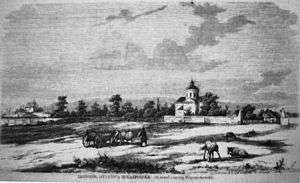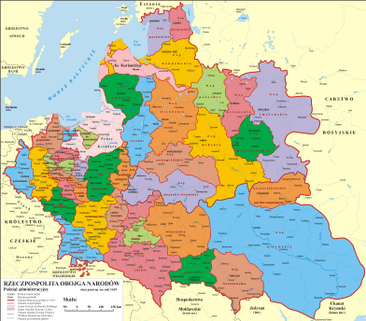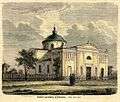Zlatopil
Zlatopil (Ukrainian: Златопіль; also as the Russian transliteration Zlatopol) was a small city in Ukraine, located about 67[1] km northwest of Kropyvnytskyi.


History
The name of this village before 1787 was Hulajpol.[2] During the partitions of Poland many residents of town resettled near the Sea of Azov establishing another town of Huliaipole.[3] In 1923–1959 Zlatopil was an administrative center of Zlatopil Raion. Since 1959 it is part of Novomyrhorod city.
Before the Holocaust, Zlatopil was a prosperous Jewish Shtetl. There was also a gymnasium (school) for rich people in Zlatopil. Some Jews of Zlatopil served in the Russian army during World War I and suffered under the pogroms of 1918–1920. Those who remained in Zlatopil were killed in August 1941. After World War II the Jews who survived in the Red Army returned to Zlatopil and buried the Jews of Zlatopil in a common grave in the old Jewish cemetery of Zlatopil. Today there are almost no Jews in Zlatopil.
Some of the most famous Jewish families of Zlatopol are: Brody, Rabbi Nachman of Breslov, rabbis Elijah and Hillel Poisic, (the composer) Pokrass, and Zola.
Notable people
- Anna Bilińska-Bohdanowicz (1857 – 1893) Polish painter
- Lazar Brodsky (1848 – 1904) Imperial Russian businessman of Jewish origin, sugar magnate
- Alexander Myshlayevsky (1856–1920) Imperial Russian general
- Hillel Poisic (1881 – 1953) Imperial Russian rabbi
- Milly Witkop (1877 – 1955) Imperial Russian anarcho-syndicalist of Jewish origin, feminist writer and activist
Gallery
 Parochial church in Zlatopil
Parochial church in Zlatopil- Built in 1891 the Zlatopil male gymnasium in 2012
- Entrance to Jewish cemetery in 2012
References
- Assuming that where Zlatopilska street is today (Meaning 'Of Zlatopil'), is where the village was.
- http://www.yadvashem.org/untoldstories/database/index.asp?cid=818
- Sklyarenko, Ye. Huliaipole (ГУЛЯЙПОЛЕ). Encyclopedia of History of Ukraine. 2004
- Zlatopol JewishGen